NEWS
PMB, 36 Governors Agree On 71 Ways To Boost Economy

The two-day retreat of the National Economic Council (NEC) ended Tuesday in Abuja with federal authorities and the country’s 36 states agreeing on at least 71 proposals they believe will reinvigorate Nigeria’s wobbling economy.
The NEC is chaired by the Vice President, Yemi Osinbajo, and its membership include the 36 state governors and some Ministers and heads of relevant government agencies.
At the end of the meeting, with theme: ‘Nigerian States: Multiple Centres of Prosperity’, participants took far-reaching decisions to urgently rescue the economy from collapse.
Decisions were taken in the areas of agriculture, solid minerals, revenue generation and fiscal stability, infrastructure and services, investment, industrialisation and enabling monetary policies. Proposal were also made on survival of the states and on how to invest in the Nigerian people.
A steering committee to implement the proposals was formed at the meeting. It is to be headed by Vice President Osinbajo.
Also constituted was an implementation monitoring committee headed by Zainab Ahmed, Minister of State for Budget and National Planning.
President Muhammadu Buhari had delivered an address at the opening of the retreat, saying there is unanimity of opinion in Nigeria that the nation’s economy is in bad shape.
The president said four key areas, namely agriculture, power, manufacturing and housing, requires urgent attention to revive the economy.
Below are the proposals agreed at the meeting.
NATIONAL ECONOMIC COUNCIL RETREAT HIGHLIGHTS
Theme: Nigerian States: Multiple Centres of Prosperity
The following are highlights of the just concluded NEC Retreat:
1. Agreement reached for concerted and consistent efforts to diversify revenue sources
2. Expand compliance on VAT, adopting a gradual plan for rate increase
3. Increase expenditure through borrowing, which should be invested in infrastructure
4. Federal and State Governments to focus on fiscal responsibility as a critical element in macro-economic balance
5. Increase investment in infrastructure through public private partnership (PPP)
6.Develop financial inclusion strategies to cater for the poor and vulnerable population
7. Maintain a minimum level of capital expenditure of 30% in the budget
Thematic Areas – Agriculture
1. The Federal Government to re-position Bank of Agriculture to enhance its capacity to finance agriculture.
2. Funding for Agricultural sector is considered critical and sources of intervention funding from the Central Bank of Nigeria should be considered
3. A single digit interest rate for agricultural loans should be considered while duties and taxes for Agricultural products and equipment should be waived
4. Develop strategic partnerships between Federal and State government. Each State should make specific commitments to crops in which it has comparative advantage and request Federal Government intervention
5. National targets for self-sufficiency should be set for identified crops, which should be monitored. Tomato paste – 2016, Rice – 2018, Wheat – 2019
6. The Federal and State Governments should roll out agricultural extension services nationwide
7. The Commodity Exchanges should be established for price regulation and avoidance of losses due to lack of markets. The Abuja Commodity Exchange should be revitalised
8. The National Agricultural Land Development Authority (NALDA) should be re-established
9. Federal Government should develop an Agriculture Implementation plan whereby State Governments are encouraged to identify at least two crops in which they have comparative advantage
10. States should open up of rural/feeder roads to facilitate transportation of agricultural produce to be supported by the Federal Government
11.The Federal and State Governments should establish minimum price guarantee for farm produce
12.The Federal Government should provide immediate funding to upscale efforts of Agricultural Institutes of Research and Development across Nigeria
13. State Governments should also be encouraged to fund research and development in agriculture through technical colleges, universities and research institutions
Thematic Area – Solid Minerals
1. Ministry of Solid Minerals Development to complete and present the solid minerals development roadmap. This framework should address issues of illegal miner, licenses, taxes and royalties by 31st March 2016
2. Federal government to engage with state government on the roadmap and agree any amendment that may be required by 30th June 2016
3. Initiate relevant legislative changes that maybe necessitated by the agreed roadmap by 31stJuly 2016
4. Conclude the revalidation/recertification of all mining leases by 30th September 2016
5. Agree with states and local government on respective responsibilities for developing feeder roads and other critical infrastructure for solid minerals development
6. Federal Government and States to set deadlines to achieve self-sufficiency in Bitumen/Asphalt and tiles (to discourage/stop importation)
7. Make and communicate final decisions on operationalization of Ajaokuta steel plant by 30th June 2016
8. Establishment of joint committee to address issues of data on quantity and quality of minerals exploited and exported
9. Setting up of mining cadastral zonal offices for proximity to States for the purpose of issuing licenses and easy monitoring by States
10. Discourage use of wood for cooking by promoting use of coal briquettes
11. Guarantee access to finance solid minerals development via intervention funds and private sector capital
12. Block revenue leakages in the sector through effective monitoring of activities in the mining sector
13. Organise artisanal/small-scale miners as a mechanism for reducing illegal mining and Establish Mines Surveillance Taskforce by September 2016
Thematic Area – Investment, Industrialisation and Enabling Monetary policies
1.Ministry of Industry, Trade & Investment (MITI) to develop a matrix of actions to be taken by Federal and State Governments towards achieving the targeted improvements in Ease of Doing Business ranking by 30th April 2016
2. Present an incentive scheme for States taking actions towards improvement of the investment climate in their States including grants by 30th September 2016
3. Forge strong links between the Nigeria Investment Promotion Commission (NIPC) and the State Investment Promotion Agencies
4. States to collaborate more actively on regional basis on investments and industrialization
5. The Federal Government should work with the States and other stakeholders to create an enabling environment for trade and investment through the implementation of the Nigerian Industrial Revolution Plan (NIRP) to encourage industrialization
6. Make environment conducive for the Micro, Small & Medium Enterprises to create jobs for the unemployed and undertake deliberate policies to create access to funds
7. State and Federal Governments must emphasize the patronage of “Made in Nigeria” products. “Import competition” rather than “import substitution” should be emphasized
8. Governors to set up task forces to monitor implementation of trade/ investment policies and strengthen planning institutions by linking federal and sub-national planning; in this regard, a monthly meeting between the Minister of Budget & National Planning and State Commissioners for planning will be institutionalised
9. States to set up one-stop shop for investors where they do not currently exist to attract investment and improve on IGR Safeguard competitive market economy
10. Promote regional cooperation on investment and industrialisation
11. Implement institutional and structural reforms as a way of improving the efficacy of monetary policy including greater consultation with the National Economic Council
12. Predictability and consistency of the Central Bank of Nigeria’s communication to key stakeholders is required to manage expectations
13. The Central Bank of Nigeria should carry the States along in some of their reforms in areas of SMEs and Agricultural funding initiatives
14. Long-term development goals should anchor policy decisions
15. Effective regulation & supervision to improve confidence in the soundness and stability of the banking system
Thematic Area – Infrastructure and Services
1.Develop infrastructure delivery plan considering current financial capabilities driven principally by the goal of improvement of the quality of life for the populace
2.Develop financing model for infrastructure projects
3. Integrate training and job creation components in infrastructure projects
4. Implement empowerment and entrepreneurship policies to foster inclusive growth
Thematic Area – Investing in our people
1. Federal and State Governments to work collaboratively to ensure sustainability of the school feeding and other social protection programmes
2. Cooperation from the States’ Ministries of Education and State Universal Basic Education Board (SUBEBs) for the Teacher Corp program
3. Provide logistics support on the proposed upgrade of 75 existing National Directorate of Employment (NDE) facilities (across the various States) to Empowerment Centers
4. Cooperation and coordination with the States on their specific job creation efforts
5. State Government support on identified needs such as infrastructure and/or space for innovation hubs
6. State Government support for artisan training, scoping and support for existing artisan cultures, use of existing training facilities
7. Institutionalize a single register as a platform for targeting the authentic poorest and vulnerable for safety net programs; for government, donor agency, organizations or individuals
8. Creating a delivery mechanism that ensures efficient, consistent timely and direct payments in the remotest parts of the country
9. Boost productivity and financial inclusion for the poorest and most vulnerable
Thematic Area – Revenue Generation and Fiscal Stability
1. There is need for deliberate effort to generate relevant data on the respective economies of the states and the nation generally in order to drive revenue generation
2. FIRS and SIRS need to invest in relevant technology to support efforts to improve tax collection
3. There is a need to develop incentive schemes for federal and state revenue generating agencies
4. FIRS and SIRS need to actively collaborate on initiatives to improve tax collection, including joint audits of major corporate tax payers
5. All state governments are encouraged to establish efficiency units to review/enhance the quality of expenditure as well as plug revenue leakages
6. Focus on property and consumption taxes will help in improving revenues in a fair manner
7. Tax-payer education should be intensified to expand the tax base and avoid political back-lash from intensifying tax collection
8. State Government are encouraged to rationalise number of Ministers, Commissioners and Permanent Secretaries
9. Cost control measures should be identified and implemented on an ongoing basis; in this regard various examples from Nigeria and other countries are recommended
Thematic Area – Survival of States and Beyond
1. Strengthen States Peer Review Mechanism under auspices of the Governors Forum and the National Economic Council (NEC) to promote sharing of good practices between the Federal and States Governments
NEC RETREAT – IMPLEMENTATION STEERING COMMITTEE FORMED:
• To oversee the work of the implementation committee
• To provide appropriate steers to the Implementation Monitoring Committee to ensure that the resolutions agreed at the retreat are duly followed up
HE Prof. Yemi Osinbajo
Vice President and Chairman of NEC
Chairman
HE Abdulaziz Y. Abubakar
Chairman, Nigeria Governors Forum and Governor of Zamfara State
Member
HE Adams Oshiomhole
Governor of Edo State
Member
HE Abdulfatah Ahmed
Governor of Kwara State
Member
HE Rauf Aregbesola
Governor of Osun State
Member
HE David Umahi
Governor of Ebonyi State
Member
HE Badaru Abubakar
Governor of Jigawa State
Member
HE Mohammed Abubakar
Governor of Bauchi State
Member
Sen. Udoma Udo Udoma
Hon. Minister of Budget and National Planning
Member
Mrs. Kemi Adeosun
Hon. Minister of Finance
Member
Dr. Okechukwu Enelama
Hon. Minister of Industry, Trade and Investment
Member
Chief Audu Ogbe
Hon. Minister of Agriculture
Member
Dr. Kayode Fayemi
Hon. Minister of Solid Minerals
Member
Mr. Babatunde Fashola
Hon. Minister of Works, Power and Housing
Member
Mrs. Nana F Mede
Permanent Secretary, Ministry of Budget and National Planning
Secretary
NEC RETREAT – IMPLEMENTATION MONITORING COMMITTEE FORMED
• To follow up the implementation of the resolutions of the retreat
• To receive steers from the Steering Committee regarding the follow up of the implementation
• To provide progress reports to the Steering Committee on the implementation
NAME
DESIGNATION
ROLE
Mrs Zainab S. Ahmed
Hon. Minister of State, Budget and National Planning
Chairman
Mrs Yosola Akinbi
Senior Technical Adviser to the Vice President on the National Economic Council
Member
Mr. L.O.T. Shittu
DG, Nigeria Governors Forum
Member
Mr. David Olofu
Commissioner for Finance and Planning, Benue State
Member
Mr. Mohammed Kauji
Commissioner for Finance and Economic Planning, Borno State
Member
Dr. E.A. Onwiodokif
Comm. for Economic Planning, Akwa Ibom State
Member
Mrs. Aisha M. Bello
Comm. for Budget and Planning, Kano State
Member
Mrs. Aderenle Adesina
Commissioner for Budget and Planning, Ogun State
Member
Mr. Mark Okoye
Special Adviser, Economic Planning and Budget, Anambra State
Member
Mr. Tunde Lawal
Director, Macroeconomic Analysis Department, Fed. Min. BNP
Member
Mr. Kayode Obasa
Director, Economic Growth, FMBNP
Member
Mr. A.B. Saadu
Director, Special Duties
Member
PREMIUM TIMES
NEWS
Force PRO Benjamin Hundeyin visits NUJ FCT, calls for media collaboration
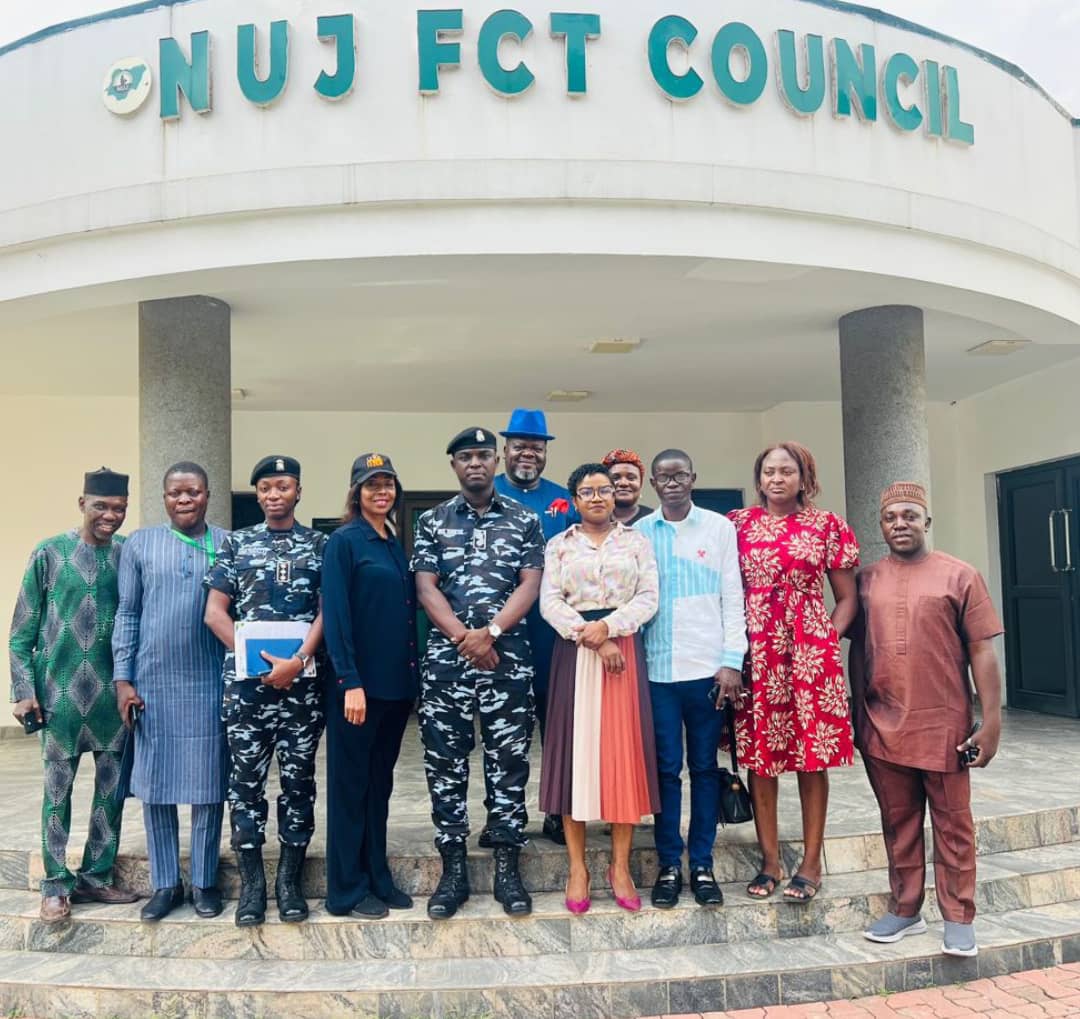
The Force Public Relations Officer of the Nigeria Police Force, CSP Benjamin Hundeyin, has called for stronger collaboration between the media and the police in the interest of national security and public trust.
Hundeyin made this appeal during a visit to the Nigeria Union of Journalists (NUJ), Federal Capital Territory (FCT) Council.
He explained that his job as police spokesman would be difficult without strong support from the media.
“I cannot succeed in this role without the collaboration of the press,” he told the gathering.
Hundeyin used the occasion to call for balanced reportage stressing that the ripple effect of negative stories can damage public confidence in the police.
“Policing relies heavily on information,” he said. “Officers can’t be everywhere at once, which is why people’s tips and shared intelligence are so important. But when the public loses trust in us, those vital sources of information dry up, and that puts everyone at risk.”
On our own part we will continue to do everything humanly possible to protect lives and property “ he said
He added that insecurity in one part of the country can affect the whole nation. Hundeyin stressed that his message was not about controlling the press, but about encouraging balanced and responsible reporting.
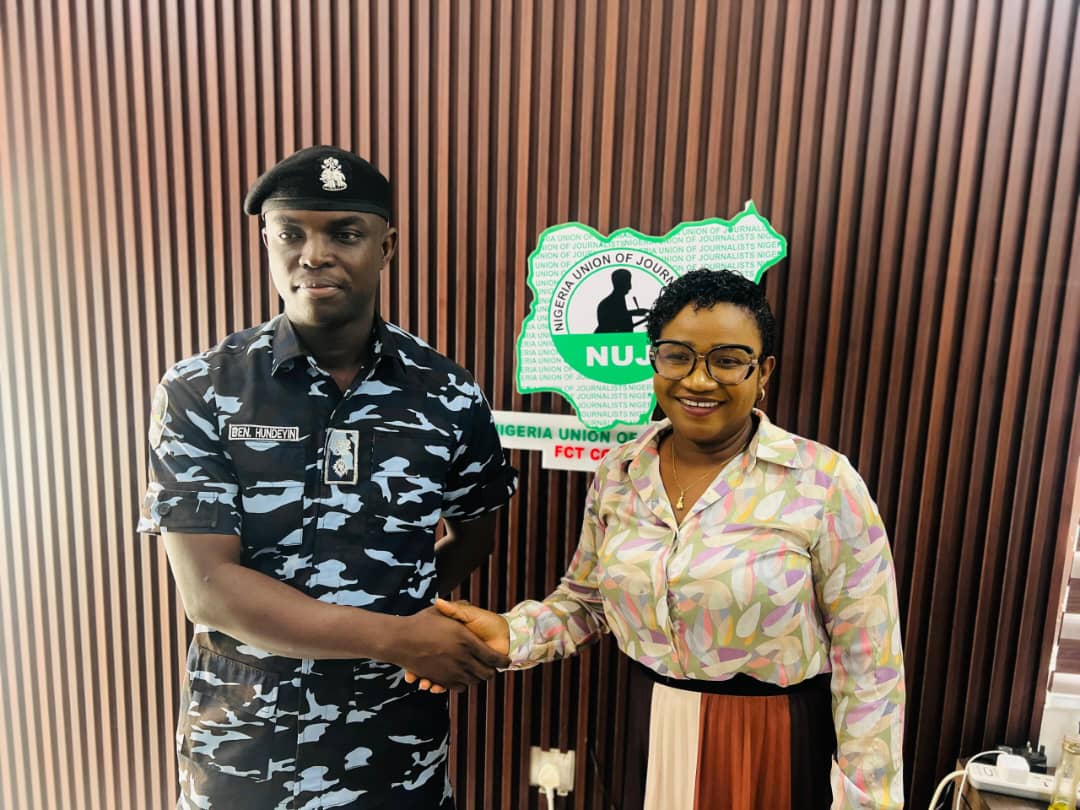
“I am appealing to you today, help us build trust,” he said. “Let’s work together through open communication and partnership to make both the police and the country stronger.”
Hundeyin also promised to respond quickly and fairly to any issues journalists face while doing their work, especially in their interactions with police officers.
In response, NUJ FCT Chairman, Comrade Grace Ike welcomed Hundeyin’s visit and expressed readiness to work closely with him.
“On behalf of the NUJ FCT Council, I warmly welcome you,” she said. “We truly value this effort by the police to connect with the media directly. It shows your commitment to open dialogue and better understanding.”
She went on to say: “The NUJ FCT does not tolerate any form of harassment or intimidation of journalists. Press freedom is a right, not a privilege.
“As journalists, we recognise the key role the police play in keeping the peace and upholding the law. At the same time, the public needs timely, accurate, and honest information to have confidence in the police and other security agencies.
“That’s why our relationship must be built on trust and cooperation.
Together, we can stop the spread of misinformation and promote reporting that helps society move forward.”
Comrade Ike pledged the support of the NUJ FCT Council in working with the police for the good of the public.
“We are ready to partner with you,” she said. “Let’s make sure information flows freely and responsibly, so that both our institutions can serve the people better.”
Hundeyin was warmly received by the NUJ FCT Chairman, Ms Grace Ike, along with other council members including Secretary Comrade Jide Oyekunle, Assistant Secretary Ms Sharon Emefia, Auditor Rosemary Ukoko-Tega, Financial Secretary Henry Daniel Abimiku, and Ex-Officio 1, Ebriku John Friday.
NEWS
JUST-IN: Gov Fubara returns to Port Harcourt as Tinubu ends Emergency Rule
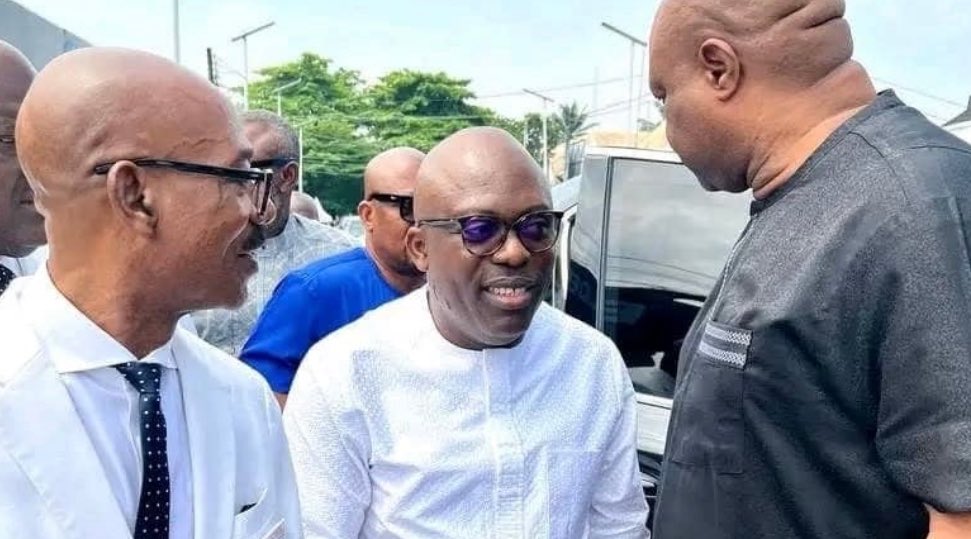
Rivers State Governor, Siminalayi Fubara, returned to the state on Friday, landing at the Port Harcourt International Airport, Omagwa, at about 11:55 a.m. to the cheers of his supporters who trooped out to welcome him.
His return comes hours after President Bola Tinubu lifted the emergency rule imposed on the state on March 18, following a political crisis that saw Fubara and his deputy, Ngozi Odu, suspended from office.
Despite his arrival, the governor had yet to resume at the Government House office as of Friday afternoon. On Thursday, the Rivers State House of Assembly reconvened, but hundreds of Fubara’s supporters who had gathered at the Government House in anticipation of his return waited in vain.
During the emergency rule, Tinubu appointed retired Admiral Ibok-Ete Ibas as sole administrator to oversee the state. In a farewell broadcast on Wednesday, Ibas handed over power and urged political actors in Rivers to embrace dialogue and mutual respect.
The crisis in the state began after Fubara fell out with his predecessor, Nyesom Wike, now Minister of the Federal Capital Territory, over control of Rivers’ political structure. The feud split the state assembly and escalated into violent confrontations.
In June, Tinubu convened a reconciliation meeting with Fubara, Wike, Assembly Speaker Martin Amaewhule, and other key stakeholders.
By July, Ibas inaugurated the Rivers State Independent Electoral Commission (RSIEC), led by Michael Odey, which conducted council elections across the state on August 30.
The All Progressives Congress (APC) won 20 local government areas, while the Peoples Democratic Party (PDP) secured three.
NEWS
Nigerian Born Int’l Journalist, Livinus Chibuike Victor, attempts to attain Interviewing Marathon of 72hours 30 Seconds

Journalists plays an essential role in promoting transparency, challenging power, and giving a voice to the voiceless. Despite increasing threats to press freedom across the world.
As the world reflects on the vital role journalists play in upholding democratic values, Livinus Chibuike Victor, Imo State born globally acclaimed journalist, proudly announce a historic Guinness World Record attempt for the longest interviewing marathon, with the Theme (NIGERIA OUR STRENGTH) scheduled to take place from 28th September to October 1st 2025, at Tangier Hotel, 34, Ekukinam street, Besides ABC Transport, Utako, Abuja.
The record attempt according to Victory, aims to highlight the enduring impact of journalism in a democratic society, a profession that continues to educate, empower, and hold those in power accountable. In an age where truth is often under siege, this initiative seeks to draw attention to the essential need for a free, ethical, and fearless press.
“Democracy is impossible without an informed public, and journalists are the ones who make that possible, “This attempt is not just about setting a new world record; it’s about celebrating truth, integrity, and the powerful role journalism plays in building and sustaining open societies.

The Guinness World Record attempt will feature a series of activities designed to engage the public, celebrate press freedom, and honor the sacrifices made by journalists around the world.
Members of the public, media professionals, and civic leaders are invited to witness and support the event as it unfolds over three inspiring days at the Tangier Hotel, Ekukinam Street, Utako,.Abuja, Nigeria.
About Livinus Chibuike Victor
Livinus Chibuike Victor is a Nigerian journalist known for his fearless reporting and advocacy for Press Freedom. He has worked tirelessly to promote transparency and accountability in society through his work.
-

 SPORTS19 hours ago
SPORTS19 hours agoBarcelona edge Newcastle 2-1 thanks to Rashford’s Second-Half magic
-

 NEWS10 hours ago
NEWS10 hours agoNigerian Born Int’l Journalist, Livinus Chibuike Victor, attempts to attain Interviewing Marathon of 72hours 30 Seconds
-

 NEWS10 hours ago
NEWS10 hours agoNSITF mourns Afriland Towers fire VICTIMS, calls for stronger workplace safety
-

 NEWS10 hours ago
NEWS10 hours agoSouth East NUJ hosts homecoming, awards Chris Isiguzo Lifetime Achievement Honour
-
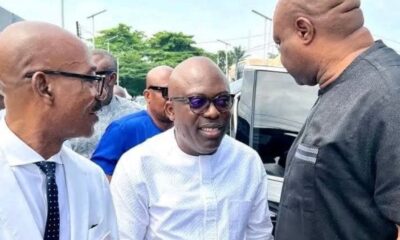
 NEWS6 hours ago
NEWS6 hours agoJUST-IN: Gov Fubara returns to Port Harcourt as Tinubu ends Emergency Rule
-
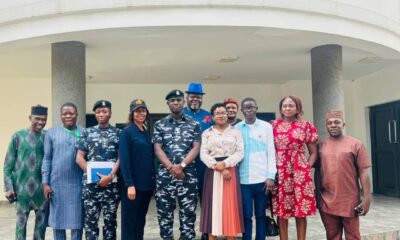
 NEWS33 minutes ago
NEWS33 minutes agoForce PRO Benjamin Hundeyin visits NUJ FCT, calls for media collaboration
